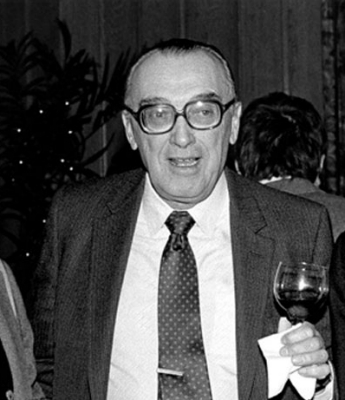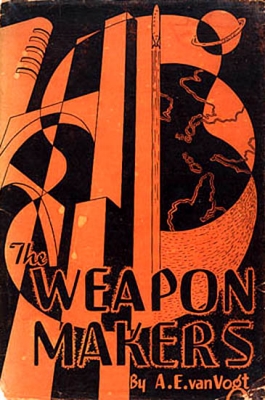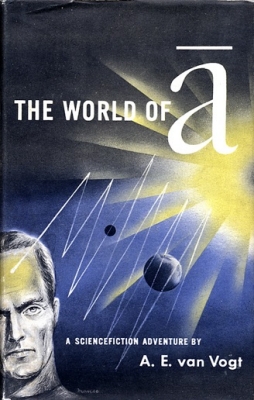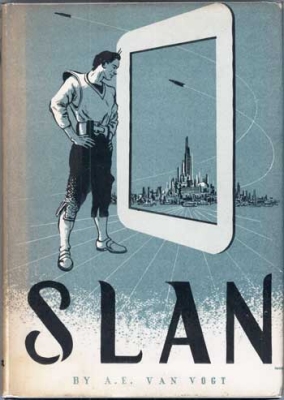The Golden Age of Science Fiction: A.E. van Vogt

The Ceourl Award was founded in 1980 to recognize Canadian Science Fiction and for the first two years was presented for Lifetime Achievement only. The original nickname for the award was based on the similarity of the award and the creature feature in A.E. can Vogt’s story “Black Destroyer.” The name was changed to the Casper Award in its second year. In the award’s third year, a category for Outstanding Work in English was added to the award, with additional awards added in subsequent years. In 1991, the popular award’s name was changed to the Aurora Award. The awards are administered by the Canadian Science Fiction and Fantasy Association (CSFFA) and are voted on by members of the annual Canadian National Convention. Although the Lifetime Achievement Award was presented annually from 1980-1983, only three additional awards have been presented, most recently in 2013 to Robert J. Sawyer. The first award was presented to A.E. van Vogt at Canvention 1 in Halifax, Nova Scotia on the weekend of March 7-9.
Alfred Vogt was born on April 26, 1912 in Edenburg, Manitoba, Canada. During the early years of his life, his family moved around Western Canada, never settling down long enough to have roots. The stock market crash of 1929 killed van Vogt’s chances of attending college and he began to work a series of odd jobs, including work as a farmhand, a truck driver, and for the Canadian census bureau. While working these jobs, he began to publish anonymously and pseudonymously in the “true confessions” genre.
Around 1930, he moved back to Winnipeg, where he continued to write pseudonymously, as well as selling advertising space in newspapers. During this time, he wrote radio dramas for the local station. He also began to play with his name, adding the middle name Elton and the van to become Alfred Elton van Vogt and eventually A.E. van Vogt.
van Vogt made his science fictional debut in the July 1939 issue of Astounding with the story “Black Destroyer,” and issue which also featured Isaac Asimov’s first appearance in that magazine. The same year, he married Edna Mayne Hull, who would frequently be credited as van Vogt’s co-author.
With stories that included The World of Null A, Slan, and The Voyage of the Space Beagle, at one time van Vogt was a popular author on par with Asimov. During the war years, van Vogt wasn’t allowed to enlist due to poor eyesight, he was able to continue writing while other established authors were engaged in the war effort, either in a military or civilian role. As the war neared its end, van Vogt moved to Hollywood, obtained US citizenship, and officially changed his name from Alfred Vogt to Alfred Elton van Vogt, called Van.
Van Vogt and Hull were the Guests of Honor at the fourth World Science Fiction Convention, Pacificon I, in 1946, the first held after World War I.
Shortly after his arrival in California, van Vogt made the acquaintance of L. Ron Hubbard and became the head of Hubbard’s Dianetics operation in Los Angeles. He continued to be connected to Dianetics, which meant that his own writing output, as well as his personal finances, suffered as he supported Hubbard’s organization. During this time, van Vogt began to stitch his related stories into novels that he called “fix-ups,” often using the money to improve the Dianetics Center.
After closing the Dianetics Center in 1961, van Vogt turned his attention back to writing science fiction, although he was never able to regain the level of acclaim that he had in the early 1940s. However, van Vogt’s early career has been seen as important in the development of science fiction, with fans adopting the catch phrase “Fans are Slans,” based on the super-humans he created in the novel Slan. In 1996, van Vogt was named a Grand Master by the SFWA. That same year the Worldcon, L.A.con III, presented van Vogt with a Special Committee Award for his six decades of golden age science fiction. 1996 also saw van Vogt inducted in the inaugural class of the Science Fiction Hall of Fame.
This year, van Vogt has been nominated for a Retro Hugo for his novel The Weapon Makers.
No other nominees for consideration for the first Casper Award were announced.
 Steven H Silver is a sixteen-time Hugo Award nominee and was the publisher of the Hugo-nominated fanzine Argentus as well as the editor and publisher of ISFiC Press for 8 years. He has also edited books for DAW and NESFA Press. He began publishing short fiction in 2008 and his most recently published story is “Webinar: Web Sites” in The Tangled Web. Steven has chaired the first Midwest Construction, Windycon three times, and the SFWA Nebula Conference 6 times, as well as serving as the Event Coordinator for SFWA. He was programming chair for Chicon 2000 and Vice Chair of Chicon 7.
Steven H Silver is a sixteen-time Hugo Award nominee and was the publisher of the Hugo-nominated fanzine Argentus as well as the editor and publisher of ISFiC Press for 8 years. He has also edited books for DAW and NESFA Press. He began publishing short fiction in 2008 and his most recently published story is “Webinar: Web Sites” in The Tangled Web. Steven has chaired the first Midwest Construction, Windycon three times, and the SFWA Nebula Conference 6 times, as well as serving as the Event Coordinator for SFWA. He was programming chair for Chicon 2000 and Vice Chair of Chicon 7.



Coeurl. “Ceourl” just looked wrong, but fortunately I did remember “On and on Coeurl prowled” and was able to Google it from that.
Good catch, bomolub!